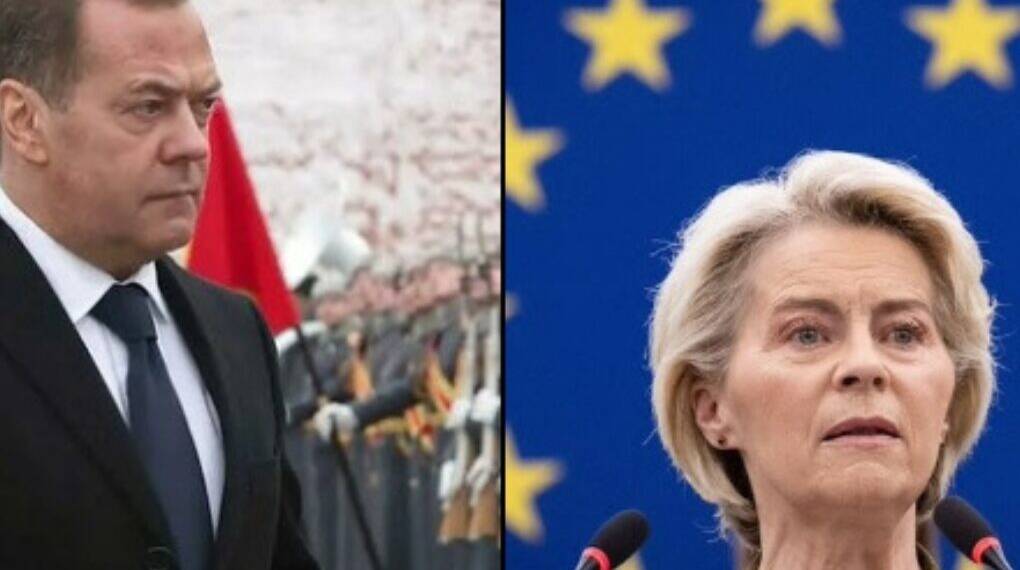Tensions between Russia and Western powers have surged as Russia issues stark warnings over two contentious issues: the European Union’s (EU) potential use of frozen Russian assets to support Ukraine and NATO’s involvement in countering Russian drones over Ukrainian airspace.
Dmitry Medvedev, Deputy Chairman of Russia’s Security Council and former president, has taken to Telegram to deliver fiery threats, raising the specter of severe retaliation, including the possibility of global conflict.
EU’s Plan to Use Frozen Russian Assets
The EU is reportedly exploring a “Reparations Loan” initiative, which would utilize profits from over $300 billion in frozen Russian assets, primarily maturing bonds held at the European Central Bank, to fund Ukraine’s defense and reconstruction efforts. This move has provoked a vehement response from Moscow, with Medvedev issuing a blistering warning to EU states and officials in Brussels.
In his Telegram posts, Medvedev vowed that Russia would pursue relentless retaliation—legal, extralegal, and otherwise—against any EU nation involved in seizing Russian assets. He ominously declared that Russia’s response would persist “until the end of the century,” signaling a long-term campaign of reprisals. The EU’s consideration of this financial strategy underscores its commitment to supporting Ukraine but risks escalating economic and diplomatic friction with Russia.
Russia’s Warning of World War III Over NATO Actions
While Medvedev also warned that any NATO intervention to shoot down Russian drones over Ukraine would be tantamount to declaring war on Russia. He dismissed Ukraine’s calls for a no-fly zone as “provocative” and labeled Ukrainian leaders and their Western supporters as “idiots.” Medvedev argued that such actions would justify a full-scale conflict between Russia and NATO, potentially escalating to a nuclear confrontation.
These remarks come amid heightened Russian military activity, including drone operations over Ukrainian territory, which have tested Western resolve. Medvedev’s rhetoric reflects Russia’s broader strategy of using inflammatory language to deter NATO from deepening its involvement in the Ukraine conflict.
Medvedev’s Role
Dmitry Medvedev, once seen as a relatively moderate figure during his presidency from 2008 to 2012, has adopted an increasingly hawkish and inflammatory tone in recent years. As Deputy Chairman of Russia’s Security Council, he frequently uses Telegram to issue unfiltered threats and rally domestic support for Russia’s positions. His latest outbursts underscore Russia’s growing frustration with Western policies, particularly those aimed at undermining its economic and military leverage.
While Medvedev’s statements may partly serve as posturing for domestic audiences, they also signal Russia’s readiness to escalate tensions with the West. His warnings of “World War III” and prolonged retaliation against the EU highlight the Kremlin’s strategy of leveraging fear to influence Western decision-making.
Implications for Global Stability
The dual threats of asset seizure and NATO’s potential actions reflect a broader deterioration in Russia-West relations. The EU’s plan to redirect frozen Russian assets could set a precedent for international financial sanctions, prompting Russia to retaliate through cyberattacks, economic measures, or asymmetric warfare. Similarly, any NATO move to engage Russian drones risks miscalculation, potentially spiraling into a broader conflict with catastrophic consequences.
The international community faces a delicate balancing act: supporting Ukraine’s sovereignty while avoiding actions that could trigger a wider confrontation. Medvedev’s rhetoric, though hyperbolic, underscores the high stakes involved as Russia seeks to deter Western escalation.
Russia’s latest threats, articulated by Dmitry Medvedev, highlight the precarious state of global geopolitics amid the ongoing Ukraine conflict. The EU’s potential use of frozen Russian assets and NATO’s role in countering Russian drones are flashpoints that could further destabilize relations.
As both sides navigate this volatile landscape, the risk of missteps leading to broader conflict remains a pressing concern. Diplomatic efforts and measured responses will be critical to preventing escalation and preserving global stability.








